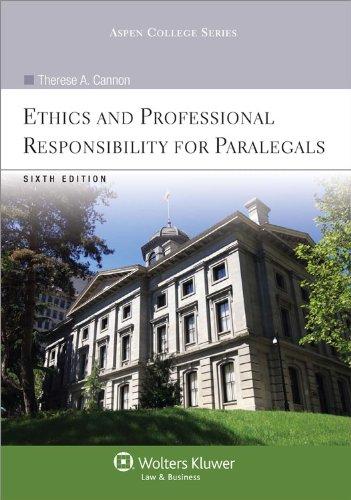This is an attorney malpractice case arising from a real estate transaction. The lawyer represented a corporate
Question:
This is an attorney malpractice case arising from a real estate transaction.
The lawyer represented a corporate client and employed an untrained paralegal who played a significant role in the closing of the transaction.
The relevant facts mainly are undisputed. Appellee Willoughby Corporation, the plaintiff below, was formed in September 1974. . . .
Appellant Robert M. Musselman, a defendant below, represented the bondholders in formation of the Corporation. He became attorney for the Corporation and also served as its Secretary. He was not a member of the Board of Directors. The daily operations of the Corporation were handled from defendant’s law office by defendant’s employees. . . .
In 1976, aware that the Board of Directors wished to sell a portion of theWilloughby Tract, defendant contracted Thomas J. Chandler, Jr., a local real estate broker, who obtained an offer to purchase Parcel 9. The offer was made by Charles W. Hurt, a medical doctor who had been a real estate developer in the Charlottesville and Albemarle County area for a number of years. . . .
Subsequently, another standard form purchase contract for $215,000 was completed dated May 6, 1976. The purchaser was shown to be ‘‘Charles Wm. Hurt or Assigns.’’ . . . The contract was executed by Hurt, by Musselman on behalf of the Corporation as corporate Secretary, and by the realtor. . . .
[Stanley K. Joynes, III,] had been employed by Musselman in June 1977. Joynes had just graduated from college but had no formal training either as a lawyer or a paralegal. His main responsibility, under Musselman’s direction, was to ‘‘shepherd the Willoughby Project along.’’ Joynes attended his first Board meeting in July 1977 and was chosen Assistant Secretary of the Corporation.
In the course of the September 1977 Board meeting, defendant was directed to close the Hurt transaction ‘‘as soon as possible.’’ Three weeks later, Stuart F.Carwile,Hurt’s attorney, notifiedMusselman by letter dated September 22, 1977 that his client desired to take title to Parcel 9 as follows:
Stuart F. Carwile and David W. Kudravetz, as trustees for the Fifth Street Land Trust, pursuant to the terms of a certain land trust agreement dated 22 September 1977.
Carwile advised that after Musselman submitted a draft of the deed, Carwile would forward the proposed deed of trust and note for defendant’s approval.
The paralegal then prepared the deed, with ‘‘some assistance’’ from other employees of defendant, in accordance with Carwile’s request showing the Land Trust......
Questions about the Case 1. What functions did the paralegal Joynes perform in this transaction?
Do you think any of these duties were inappropriate functions for a paralegal to perform? Were they carried out competently?
2. What were the mistakes made by the attorney Musselman in this case?
What should he have done to fulfill his duty to the client without being negligent?
3. Do you think that Musselman adequately supervised Joynes? Why or why not?
4. Why was Joynes not named as a defendant in this action? Did Joynes act negligently? Did the court hold Musselman liable for Joynes’s mistakes?
5. How did the fact that Joynes was ‘‘untrained’’ affect the court’s thinking? Does a lawyer have a duty to hire a qualified person? A duty to match the person’s skills and knowledge to the work that is delegated?
Step by Step Answer:

Ethics And Professional Responsibility For Paralegals
ISBN: 272860
6th Edition
Authors: Therese A. Cannon





